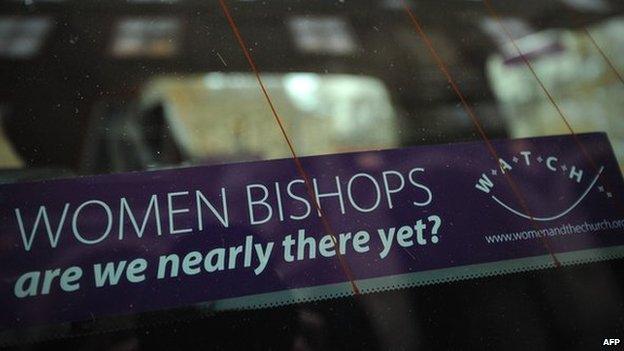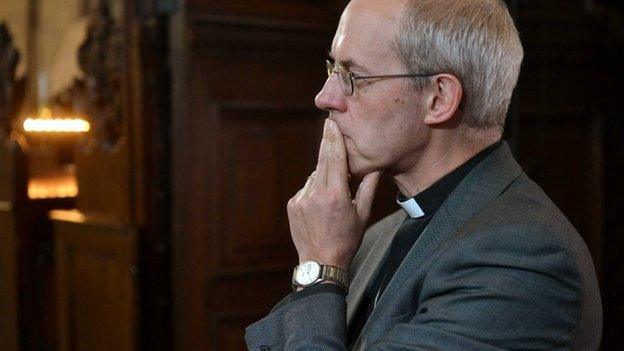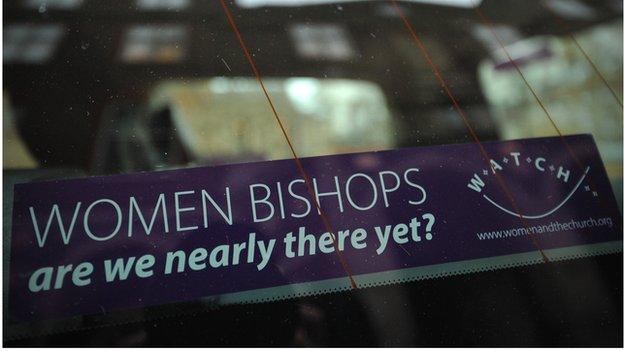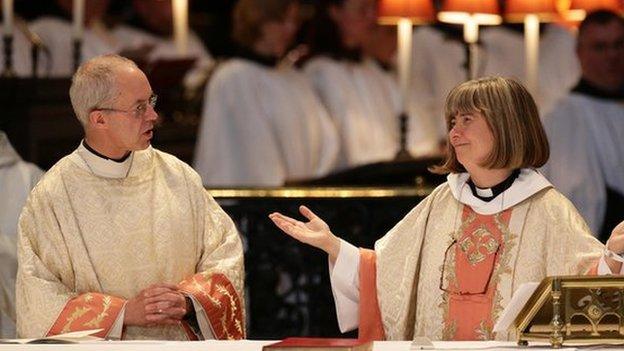Women bishops: Traditionalists told take exemptions on trust
- Published

Not for more than 20 years has the future direction and character of the Church of England turned so profoundly on a single vote.
But on Monday the Church of England broke a tradition inherited from the first Christians 2,000 years ago when the three houses of the General Synod voted to allow women to be bishops.
Since the days of Jesus and his 12 male apostles the Church has had exclusively male leaders - bishops whose authority has been handed down the generations by the laying on of hands.
Hilary Cotton chairs Women and the Church, which campaigns for women bishops.
"Saying yes to women bishops is a cosmic shift," she says.
"It changes our whole understanding of what God intended people to be, and even changes the Church's theology by recognising that men and women are equally chosen to lead it."
A senior figure on the "high church" wing of the Anglicanism, Prebendary David Houlding, says creating women bishops represents "a massive shift" in the way the Church presented itself to the world.
Defeated
"It's an unprecedented acceptance by the Church of the secular values of society", he says.
"There was a lot of damage to the Church's reputation when the measure was defeated before. It's terrified of sending the wrong signal again."
Samuel Margrave, who also opposes the legislation, told the Synod: "This is a show for the media. It's the end of the Church as we know it."
The Reverend Lindsay Southern, the Vicar of Catterick in North Yorkshire, who supports the proposals, said a single vote for woman bishops would have huge long-term effects.
"It might look like a small change in direction from the outside, but it's like a ship at sea - a change in course over time will lead us to a completely different place."
Women now constitute a third of the 11,000 Anglican priests, several of whom have reached senior positions.
The Church's 42 dioceses have given unanimous backing to the latest proposals.
But to take such a profound step, each of the Synod's three houses - representing bishops, clergy and lay people - needed to support legislation to create women bishops by a majority of two-thirds.
The legislation failed in November 2012 because lay synod members who supported women bishops nevertheless believed that traditionalists were not getting sufficient exemptions from serving under them.
The latest proposals would allow traditionalist parishes to ask a woman bishop for a male alternative, and take any dispute over the process to an independent ombudsman.
"There will be an 'expectation' that bishops will do their best to accommodate (traditionalist) parishes," says Prebendary Rod Thomas, the leader of the conservative evangelical group, Reform.
"But in the end it depends on trust, and that is the big question. Will there be trust?"
Evangelical traditionalists oppose women bishops because of their belief that the Bible calls for men to head churches.
Tide of opinion
Traditionalists on the Catholic, or High Church, wing of Anglicanism believe that because Jesus chose only men to make up his 12 apostles, only men should lead the Church.
In fact some do not believe that women can be priests, so that were a woman bishop to ordain a man as a priest, he would not truly be a priest.
High Church traditionalists will look for alternative male bishops who have been ordained by a man, and who have not themselves ordained women as priests.

Archbishop of Canterbury Justin Welby spoke before the vote of being hopeful it would pass
With the tide of opinion in the Church, and in wider society, running against them, traditionalists are being offered much less than they wanted.
After the legislation is passed, and if Parliament approves it, the new law will be "promulgated" by the Synod in November.
Committees looking for bishops for the vacancies in Newcastle, Oxford and Peterborough could then interview women candidates.
Senior bishops elsewhere might more quickly appoint a woman in the more junior role of assistant or "suffragan" bishop.
Other Anglican churches already have women bishops - there are 20 in Canada, Australia, the United States, Cuba, India, New Zealand, Swaziland and South Africa.
The Church of Ireland, which covers Northern Ireland, appointed Rev Pat Storey, as the first woman bishop in the UK in September, 2013.
- Published14 July 2014

- Published14 July 2014
